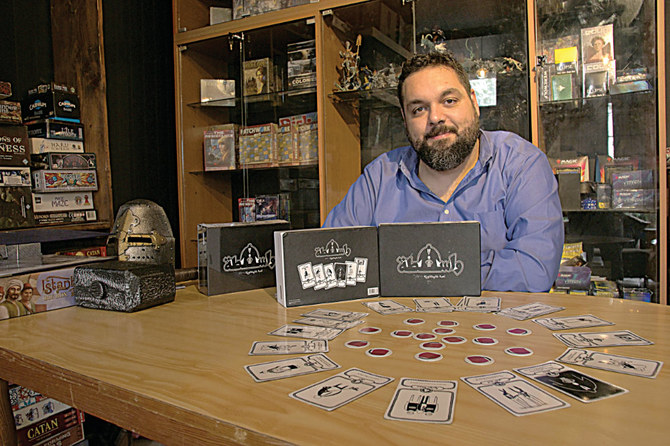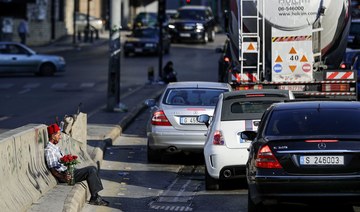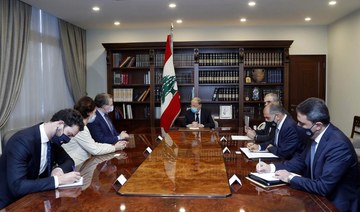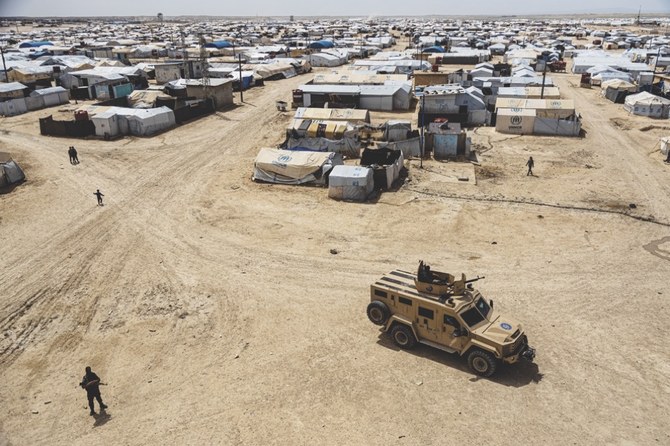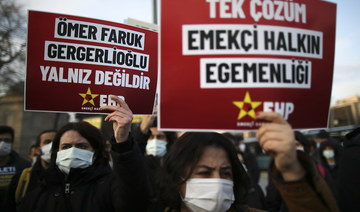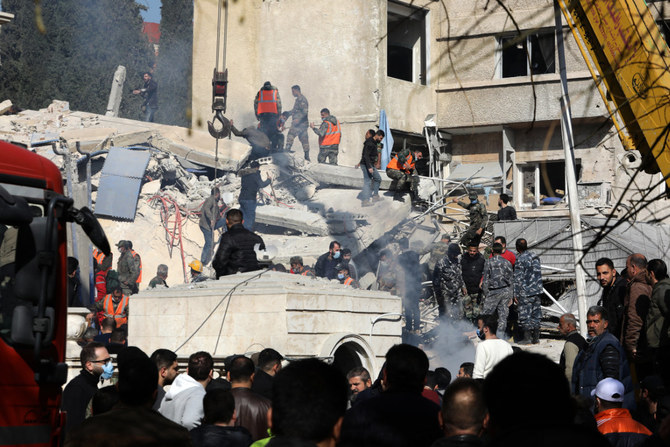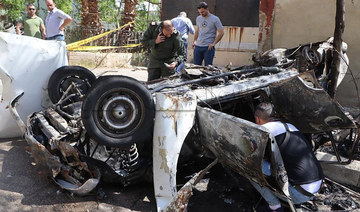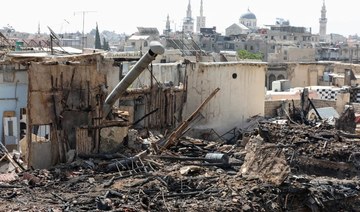BEIRUT: In the Zero 4 shopping hub in Antelias, a small town just 5 kilometers outside Beirut, Elie Kesrouwany sits at a table sipping his morning coffee, surrounded by stacks of board games. With Lebanon’s economy on the rocks and the coronavirus outbreak forcing stores to close, Kesrouwany’s business, On Board, is one of the few here that remain open.
Lying sprawled across the table is a deck of comically illustrated cards from his latest creation: Wasta.
The board game, inspired by the anti-government protests that swept Lebanon in October 2019, is an exercise in witty seriousness and black humor. The illustrations, by popular cartoonist Bernard Hage, highlight what many Lebanese view as the bane of their lives: corruption, clientilism and nepotism.
Elements of this entrenched culture have also been held responsible for the Beirut port blast on Aug. 4, when nearly 3,000 tons of improperly stored ammonium nitrate exploded, killing more than 200 people and leaving 300,000 homeless.
“I wanted to criticize society, particularly present Lebanese society,” said Kesrouwany, who lost several friends in the blast. “We are in huge pain every day. My entire generation has been suffering from our present predicament and these warlords in the government have been there for years sucking the blood of this country.”
Wasta, which takes its name from an Arabic word for political and social influence or sway, is commonly used to denote an individual’s powerful connections used to rig opportunities in their favor.
The game was first released in June, two months before the port explosion, and sold out its first batch of 500 units in just two weeks.

Illustrations by popular cartoonist Bernard Hage. (Supplied)
It has been so popular, particularly among the Lebanese diaspora, that Kesrouwany is now creating an English-language version and an expanded second edition, with new illustrated characters to correspond with the country’s latest travails.
Kesrouwany, who worked as a librarian for 17 years before establishing his business, says he has long been a lover of these humble tabletop games — a vanishing pastime in the age of smartphones and gaming consoles.
“I began collecting board games in the trunk of my car and would go into coffee shops and offer games for people to play,” Kesrouwany told Arab News. “I then organized board game nights. It was a side gig at the time and one I was greatly passionate about.”
Kesrouwany was inspired to establish his own premises following a visit to London, where he encountered an avid community of board gamers. And so, on Dec. 22, 2019, at the height of Lebanon’s revolution — known in Arabic as the “thawra” — he opened On Board, a coffee shop for board-game lovers.
“It was my dream to create a game community in Lebanon open to all ethnicities and different religious affiliations under the umbrella of having fun,” he said. “It was an anti-sectarian space.”
It was during Lebanon’s coronavirus lockdown earlier this year that the inspiration for Wasta struck. Here was a creative and enjoyable way to speak out. “Having fun is a clever way to slip ideas into the minds of people that are hard to talk to,” Kesrouwany said.
Wasta players compete using points-weighted cards, each depicting a different facet of Lebanese society. Among the characters are the sectarian thug, the banker, the mother, the journalist, the soldier and the sheep (who blindly follow the government).
While the symbolism of each card offers a crash course in the different characters that make up Lebanese society, the genius of the game lies in the way the cards interact with one another when played.
IN NUMBERS
- 89% Lebanese who reported corruption in government as a big problem in 2019.
- 68% Lebanese who thought most or all government officials are involved in corruption.
- 28/100 Lebanon’s score in 2019 Corruption Perceptions Index, which measures public-sector corruption.
The starting player (obviously a Lebanese person) is the last person who managed to withdraw “fresh money” or US dollars from the banks. “This is a sardonic twist to the start, as recently the banks weren’t parting with US dollars anymore,” said Kesrouwany.
Since April of this year, Lebanese banks have forced customers with dollar accounts to withdraw Lebanese pounds at a fraction of the black-market rate. Now the Lebanese, ever creative in their response to sudden change and instability, must exchange their “fresh money,” when they have it, on the black market to get the best value, as the Lebanese pound continues to slide.
“The game is based on kicking other players out of the game and the objective is to either have the highest number or be the last man standing at the table. The most powerful card in the game is the Lebanese flag, which is number 8. So, if you have this card in your hand and the whole deck is done, then you win the game.
“However, on the card there is a small sentence that reads that if you throw the Lebanese flag from your hand, then you lose your dignity and are out of the game.”

Cartoonist Bernard Hage in his studio. (Arab News photo by Firas Haidar)
Some aspects of the game mirror Lebanon’s system of political patronage. “The player who has the sheep picks his political leader (another player) and he follows him blindly. And if that leader wins the game, the player that played the sheep also wins a round and gains a tarboosh,” he said.
When players win a hand, they win a tarboosh — the iconic Middle Eastern felt hat. The first player to get three tarbooshes wins.
There is even an “external political influence” card — another echo of Lebanon’s entrenched clientelism, which allows you to swap cards between players. “Because both players then have information about each other’s cards, they are now pitted against each other,” he said.
If you get the “political immunity” card, then you become immune to the influence of other cards. “This is a reference to how Lebanese politicians are abusing power today to hide away from law and justice because of their political immunity,” Kesrouwany said.
And of course, there’s the “wasta” card. “Wasta can illegally copy a card that was already played on the field. It’s like a cheat card.”
Given the in-your-face style of Wasta, some amount of backlash was perhaps inevitable.

The view outside On Board restaurant in Antelias, a small town just 5 kilometers outside Beirut. (Supplied)
“Bernard (the cartoonist) has enough guts to do whatever is needed through his art and relay the right message,” said Kesrouwany, who has also caught some flak. “It was troublesome for some people. I got some calls too, but I didn’t answer.”
As with so many other things in Lebanon, Kesrouwany’s board game injects charm and humor into an otherwise bleak situation, but with a kernel of hope.
“In the expanded version (created after the Beirut explosion), I focused on the fact that the game should still be fun and that makes people forget a little bit of the pain that they went through,” he said. “At the same time, the game needs to raise awareness, but always with some positivity. This is why I made cards representing the Lebanese diaspora.”
The new version does not go into detail about the explosion, the deaths, the destruction and the broken homes. “It was too painful — we Lebanese already feel like we’ve been going through a funeral for the past month,” he said.
“Lebanon is in a very messy situation now, but we will get through it and will overcome it with time by the sheer will to live.”
_______________________
Twitter: @rebeccaaproctor






